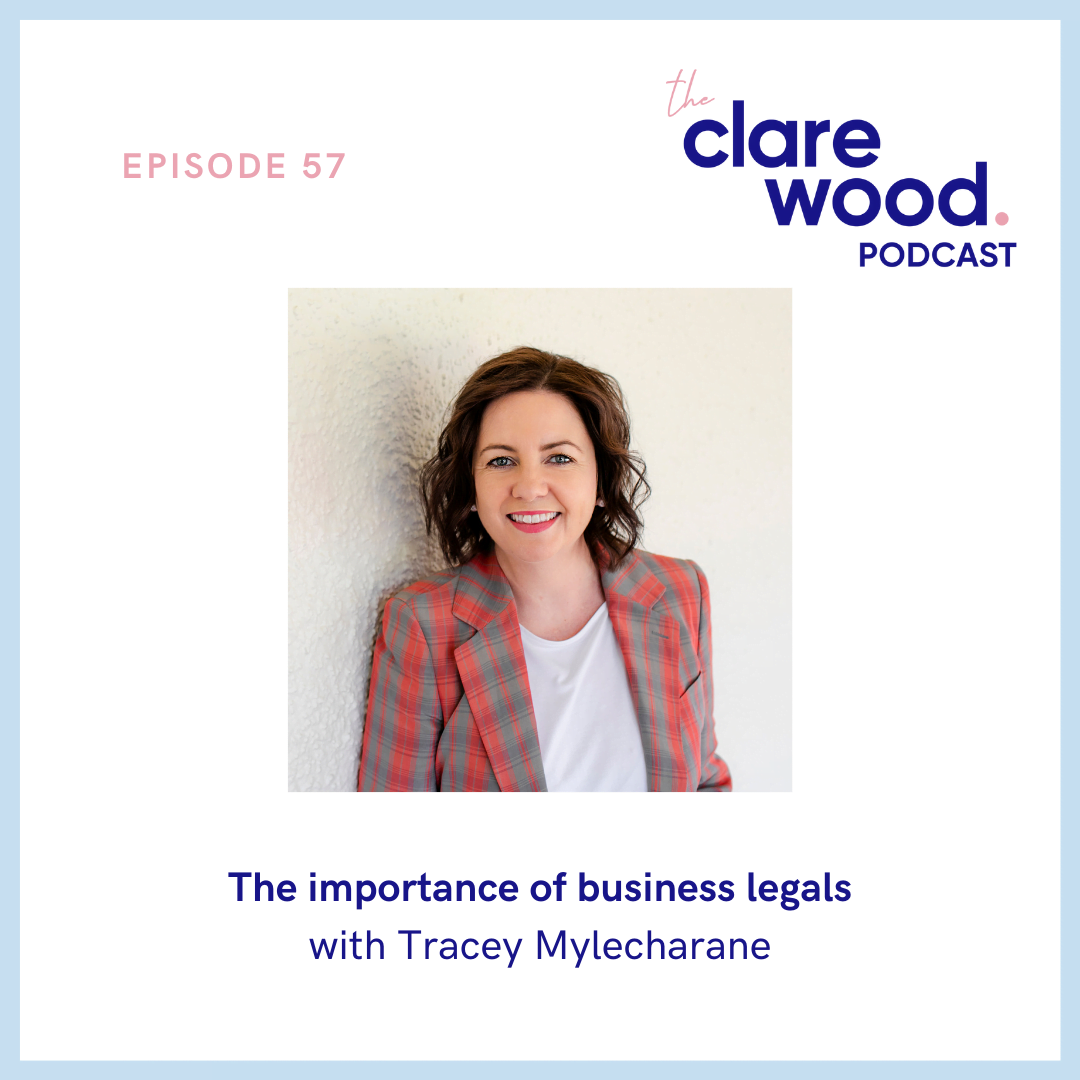Legals can be something that small business owners can turn a blind eye to… some people think “nothing will happen me!” Today’s guest Tracey Mylecharane shares why EVERY business owner needs to consider their legals and WHAT you need to have in place to protect your business.
In this Episode:
03.42: What can go wrong if legal documents are outdated or non-existent
09.53: When should a business invest in legal help
13.00: Making your business internationally compliant
15.52: The most forgotten legal frameworks for small business
18.30: How to protect your branding and content
Links:
TRACEY MYLECHARANE WEBSITE >
TRACEY MYLECHARANE INSTAGRAM >
CLARE WOOD SERVICES >
CLARE WOOD INSTAGRAM >
Tracey’s Bio
Tracey Mylecharane is the founder and Principal of Tracey Mylecharane – Solicitor, a boutique Law Practice supporting businesses across Australia. She is a business and litigation lawyer with more than 17 years’ experience. She has seen it all before; and she knows what can go wrong.
Tracey works with business owners to educate and empower them to help drive their business forward with confidence.
Transcript
Legal agreements might feel like something that isn’t necessary for your business, especially if you are in the early stages. Today’s guest, Solicitor and small business legal expert, Tracey Mylecharane, explains why your legals are such an important part of your business success, and to make sure you are protected and have peace of mind in this space. Let’s dive in.
You’re listening to the Clare Wood podcast, where we talk all things business, finance, marketing, and mindset for entrepreneurs, sharing practical tips, and actionable advice to help you take your business to the next level. Introducing your host: me! I’m Clare Wood, I’m a numbers geek, a travel lover, and a reality TV addict, and I’m here to empower you to create an extraordinary business and an amazing life, because I believe you don’t have to choose between the two. Now let’s dive right in to today’s episode.
CLARE: Welcome to the podcast, Tracey
TRACEY: Thanks for having me.
CLARE: You are the first legal person I have had on the podcast and I am super excited. I think this is an area which small business owners turn a blind eye to. Before we get started, I’d love to ask you to introduce yourself and your business.
TRACEY: I am a business owner and business lawyer. I am a mumma to two little people, 4 and 6 years, and I’ve been in the law for more than 18 years, and I’ve been running this business for about a year. My confession, I am completely obsessed with organisation and planning and just love that the area of law that I practice lends itself to that. I love that in my business I have complete control over that, because in parenting you have absolutely no control, not matter how much planning you have.
I work with other business owners who have either overlooked their legals or their legal protection because their business has been growing, changing or pivoting, and they need to really up-the-anti on legals and protection.
CLARE: Is there a particular type of client you work with over others?
TRACEY: I predominately work with established businesses who have reached the point where they have expertise and are doing really well in business, and they have acknowledged they can’t do it all, so that is where I come in, and there is a respect there for my expertise, for what business lawyers can offer and how we can add value to their journey.
CLARE: I’m really interested in this, because I think a lot of business owners think I don’t need to worry about it, or it’s not relevant to them, so I’d love to explore that further today. The first thing I want to ask is, what are the biggest mistakes you see business owners make in the space of legals and not being covered correctly.
The biggest legal mistakes business owners make
TRACEY: The first thing I see so often is, business owners focus so much on their growth, numbers and goals, which is fabulous, but it means nothing if a business is not legally protected, because it can come crashing down with one single dispute or court action. That I have seen time and time again, and that is heartbreaking. The biggest mistake is not realising that legals is something you need to focus on, just as much as numbers, goals and vision. S what is that? There are 3 things that are most common.
Not getting the business structure right. As the business grows and changes, often their needs change, and business owners don’t take into account that that might not take on the same business structure. When they initially setup there is a goal, when that is achieved, they aren’t revisiting whether that business structure is doing what it needs to do for them.
Legal documents. When business owners are growing and things are changing, they often don’t bring in legals along with them, they are forgetting or overlooking them. People think they will come back to their service agreements later, or consultancy agreements later, even contracts with their team. I see a lot of this, the needs of the team change, so consultants were once consultants but are now employees or visa versa, and they aren’t bringing their documents up to speed. So when people come to see me when there has been a hiccup, or something unexpected, their documents aren’t doing what they think they are doing, because they never updated them.
CLARE: This is huge. And I’m sure it happens a lot in small business because we think is it really that important. What are some of the things that can go wrong, examples, if someone isn’t bringing the legal documentation, contracts etc, on the journey with their business?
What can go wrong if legal documents are outdated or non-existent
TRACEY: I spent most of my career in litigation and dispute resolution, so there isn’t much I haven’t seen in terms of what can go wrong. I’ve seen livelihoods destroyed, people losing their homes, assets being destroyed. There is a better way, get it done ahead of time because prevention is better than a cure. If you don’t have your service agreements up-to-date, where a client agrees to do certain things, and you agree to do certain things, if your documents don’t reflect what you are doing in your current sense, and there becomes some misaligned expectations or deliverables that weren’t met or targets not met, or the client is disgruntled, then if you don’t have a document to say this is what I undertook to do or this is the amount, if you don’t have that, you are exposed. The client is complaining because you haven’t done something, but you say you have, but you need to show where that has been documented. Sure, we can rely on emails and conversation less so, but it gets messy, and in the legal sector when things get messy, that’s when it gets expensive and time consuming, and all of a sudden you’ve got your eye off the ball, and there is a negative flow on affect to your business. That’s one of the consequences of not having your business documents up-to-speed.
If your business structure isn’t right, your family home can be exposed, I’ve seen it so many times. We aren’t just talking the amount of the disagreement, if you enter a contract to do something for someone for $7,000 and there becomes a dispute over what it is you agreed to do, or how much it’s worth, all of a sudden multiply that by 5 or 6 by the time you get lawyers involved, and I don’t know many business owners that have a buffer of $50,000-$60,000 that they don’t mind if they lose. That’s where protection comes in and we look at personal liability, people’s houses and assets. It’s something people don’t like to think about it because it is overwhelming and scary, and no one really wants to think about that level of exposure, but if you aren’t protected it can cost you big time.
CLARE: So if are people listening, and they are in the early stages and they are thinking that’s all well and good, but I don’t have the money to get a lawyer to put contracts in place, and maybe they are thinking, I don’ have asset or have a home, no savings, surely I have nothing to lose, what would your suggestions be? When should we invest in contracts? And do they still have an exposure if they don’t own any assets.
When should a business invest in legal help
TRACEY: There is always exposure even if you don’t own assets, because if you end up in a position where you have incurred liability, then there is insolvency, you can be bankrupted, and that has a significant flow on affect to your future earning and ability to grow. Second thing, at what point should you look at getting contracts? Immediately, if not sooner. If you are running a business and selling services, you need to comply with the Australian Consumer Law, so if you don’t have contracts, it means you aren’t complying. One of the pivotal issues that the Australian Consumer Law has dealt with, is the way consumers are notified in advance of fees for engaging a service provider. You need Terms & Conditions as a service provider, at the very least, to comply with the Australian Consumer Law, to ensure you are legally protected and to demonstrate professionalism in your business to the clients you are dealing with.
When we talk about contracts, let’s not think of them as confusing and really expensive, think of them as something that is necessary, professional, protects you, and a really sound investment in your business, as well as the opportunity to connect with a really good lawyer, someone who you connect with and feel supported and empowered by working with, but can guide you along the way, but not in a ‘I need a bank loan to get this done’ way. Have a conversation, it’s a lot less overwhelming and less expensive than you think. People don’t ask the questions and explore what the costs are.
CLARE: I think it’s one of the most important things you can do in business. Getting a contract in place before working with clients, is, I believe, absolutely imperative to make sure you are protected, but also from a customer relationship experience. It’s a level of professionalism and agreement to what both parties are undertaking under that contract.
You spoke about Australian Consumer Law as we are in Australia, but we do have listeners from overseas. If you are running a global organisation, how do you ensure you are complying with laws in various different countries? A lot of businesses are online and so clients and customers are all around the world, so is there a way they need to structure things to make sure the are compliant on an international basis?
Making your business internationally compliant
TRACEY: If you are based in Australia then your derestriction is Australia, so you need to comply with consumer law here. If you are offering services in another country, then you to be familiar with the parameters that may or may not apply in another country. Some countries have requirements of what you need to do and disclose in advance. The commonwealth countries are quite similar in that the notification requirements are too different, the concept there being, have your documents in place, issued to your client before they engage with you or sign on the dotted line or clicking on the submit button, so to speak. You have an obligation to understand the laws in both. It’s not overly complicated, but I am in this stuff all day, so it’s easy for me to say, but it’s something to be aware of and get advice on.
CLARE: If in doubt, get some advice from a professional.
TRACEY: Its costs nothing to ask the question. As business owners, we don’t know what we don’t know and that’s ok, we aren’t expected to go it alone and do it all ourselves. Having yourself a lawyer is just as important to your sustainable success and growth as an accountant, financial planner, coach, designer etc. It’s part of your critical team. If you are finding that off putting, then chances are you haven’t found the right lawyer, because it isn’t supposed to be like that.
CLARE: It’s a bit like accountants. People can be resistant to looking at their numbers, but it’s something you can’t just stick your head in the sand about and hope it goes away.
TRACEY: I’ve seen when people have done that. In my 12 or so years of litigation and dispute resolution, the amount of times people will say to me “I didn’t think it would happen to me”, but it only takes one to bring it all unstuck. It’s really sad.
CLARE: This is all invaluable. Are there other things business owners need to consider when making sure they are legally protected? Ways they need to ensure so they are protecting their clients data? Conscious of about their website? What else do people forget when they are putting legal frameworks in place?
The most forgotten legal frameworks for small business
TRACEY: We’ve spoke about business terms and conditions, but there also needs to be website terms & conditions and a privacy policy. Website T&C’s are documents that go on the website and basically governs what people can and can’t do. It also protects the business from use of third party sites. For example, if you content and blogs, then people need to know that it is general advice and not legal advice specific to an issue, so there is liability and waiver conditions for all businesses.
Privacy policy is really important, because we are all collecting personal data. There is legislation in all the countries that deal with the requirements of businesses, if they are collecting personal information. Both yours and my businesses don’t necessarily meet the threshold of compulsory disclosure, of how we treat data, but the truth is we are professionals, so why wouldn’t we let our clients know, so they are comfortable in letting us have their data. It’s a simple document, how we protect their document and what circumstances we would release it, and that would only be with what’s required by law.
Those are two I find people overlook more than their business terms and conditions or service agreements. It’s really important, because if someone tries to misuse your content and tries to take action against you , of there is an issue of how data has been treated, then those are the documents you are going to need to diffuse the situation and protect yourself legally.
I know some of your listeners will scratch their heads and think this is too much! But it really isn’t. Once you start the conversation with your lawyer, they’ll unpack precisely what is required. It’s not a complicated process. I value peace of mind, and I think with the end in mind here, it is to sleep well at night and know you are protected. The three documents I work with the most is:
- Terms & Conditions or Service Agreement
- Website Terms & Conditions
- Privacy Policy
CLARE: There is one other thing that I thought of, do business owners need to be conscious of protecting the asset of their business, their name, logo and any content they create.
How to protect your branding and content
TRACEY: Sometimes. The intellectual property of a business can be really important depending on the nature of the business. That is where we get into copyright and trademark law. If your brand is really valuable to your business, so for me it’s not, because it’s my name and it’s an unusual name, but there are some businesses that have clever branding and messaging and it is appropriate to trademark it. Some businesses don’t realise, is that if you register your business name and domain name, that isn’t protecting your intellectual property or giving you exclusivity and rights, only a trademark will do that.
CLARE: If someone then is listening and thinking, this applies to me, what are their next steps to protect their intellectual assets?
TRACEY: Get some advice in relation to trademarking. There is certain criteria that IP Australia, for those in Australia, but each country has it’s own place to deal with these things. Get advice to see if you meet the criteria for exclusive use of your material.
CLARE: To sum up, please seek expert help, and no matter what area of business, if you want to talk to someone, find someone you resonate with and have a level trust with.
If people want to reach out, how can they contact you for your expertise?
TRACEY: My website or via email – www.tracey-mylecharane.com or email me at tracey@tracey-mylecharane.com.
I also have a freebie for your listeners. A lot of clients who come to me overwhelmed or not sure whether they need a lawyer, so I’ve developed a document which I call a Legal Strength Check. You can check whether you have all your things in place to protect you, and it’s on my website. It’s a good starting point and directs your attention to what you need to think about most. And feel free to review it every 12-6 months to see that your business still complies.
CLARE: Thanks for coming on Tracey.







